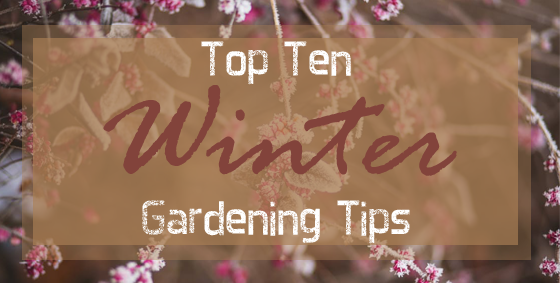
When the harsh winds and cold temperatures from winter arrive, it doesn’t mean your garden is done for good! There’s so many ways to ensure that your plants live longer! Here’s our top ten tips!
- MULCH
With the cold snow and ice, plants have a harder time avoiding the harsh elements. When this happens, they have a harder time recovering in the spring. To prevent this from happening, you should protect your plants and keep everything warm by adding mulch under and around the plants. This will help keep the root temperature stable. Mulch should be put down at the beginning on December as it will allow it to settle in and start protecting the plants before significant cold snaps happen.
- COMPOST
Some people neglect their garden in the winter as they feel as the plants do not require any protection or care. This is the farthest from the truth. If you’re a serious gardener and want your plants to thrive, you should add compost. When adding this at the right time, it will supply nutrients to the soil and plants will grow faster! Ideally when adding compost, you should only put about three inches worth around the plants so it allows them to breathe and grow.
- WATER
Before the freezing temperatures, you should water your plants… especially the annuals and potted plants. You should make sure to water their roots and above ground shoots. By doing this before a cold storm, you are able to protect your plants and ensure that they look good throughout the winter.
- EXTRA PROTECTION
Container plants should be covered with a frost cloth or a protective blanket. To keep the potted plants warm, you can also set them near the foundation of the house as it is warmer than the rest of the yard. However, during severe storms, you should bring your plants inside the house or garage.
- CONTINUE
Is the ground soft enough to dig a big hole? Then you should continue to plant. This will allow a person to continue to improve the yard and complete the job before spring! This is especially beneficial for climates where it does not get extremely cold. This might not work for gardeners in the northern states; however people living in the south or the west coast can continue to put new items into the garden most of the year.
- ANIMALS
In some areas, animals will try to eat your plants as they have no other choice. This might not be problematic for a gardener living in an urban environment, but it will be for people who live in the country. To prevent this from happening and to protect the plants, you can place a barrier around the edge of the garden. Remember that in the colder months, animals will snap and eat plants.
- LOCATION
When you plant your plants, you should try to place them facing north. When they’re exposed to the north, they will receive more sunlight and a greater temperature variation. For a new plant, this is crucial as it will prevent damage and allow it to thrive when it gets enough sunlight. This is one of the most important yet easiest winter gardening tip to follow.
- CAREFUL
When you’re using salt or other substances on your driveway or street, a gardener should be very careful. Plants will suffer from a bad PH balance when salts from the road seep into the garden. To prevent this from happening, a homeowner should lay down salt slowly and methodically when around the garden or plants.
- CHOOSE CAREFULLY
When you are planting in and right before the winter, you should be aware of which plants will thrive and which won’t. You should do research that includes looking into your specific region. If you follow this tip, you can have a successful winter landscaping setup.
- FERTILIZE OFTEN
Plants will suffer from the cold during the winter, which is hard to prevent, but by fertilizing the plants regularly, it can give them a fighting chance. With the right fertilizer, a person can strengthen the plants. This is incredibly important as some shrubs won’t survive without adequate nutrients and care.






Leave a Reply